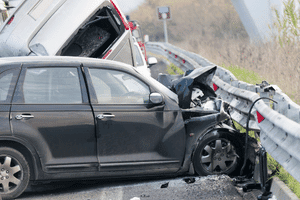
Car accidents can be traumatic, especially if the incident wasn’t your fault. You may feel frightened, shocked, and in extreme pain, if it was a high-impact collision. You might even think against getting behind the wheel ever again. When you find yourself in a no-fault accident, you must understand how to proceed. Knowing what to do after a car accident that’s not your fault, can make sure you get the maximum compensation you deserve in your car accident injury claim.
What To Do After a Car Accident Not Your Fault
After getting in a no-fault accident, the at-fault driver may try to undercut you by providing false information or failing to report the incident entirely to cover themselves. However, it’s crucial that you have every detail down pat to ensure nothing of this sort happens and you get the maximum compensation possible.
Immediately After the Crash
After an accident, it’s understandable to be frantic and panicky. It’s a normal human emotion that results from experiencing a traumatic event. Try your best to remain calm and check if you’re okay. Get yourself out of the car if you can, no matter how minor the accident was. Call an emergency medical center to attend to you and any other injured persons.
Information to Collect
If the crash was the other driver’s fault, they must report the incident. However, don’t always rely on them to make the report as others may opt not to. Collect your own information from the scene, including:
- The at-fault driver’s contact information. This includes their name, address and license number
- Their vehicle’s make, model, and color
- The at-fault driver’s insurance company and policy number
- Witness’ contact details
- Pictures of the accident scene showcasing the site damage and other driver’s license number.
Should You Call the Police?
An official police report holds more water when suing as it holds the other driver accountable for their actions. It also makes it easy for you to claim damages and repair costs. Never try to discuss reparations with the at-fault driver, even if they insist on not involving the police officers or insurers.
Similarly, avoid talking details with them regarding who is at fault. It’s best to leave such a discussion to the police if you both can’t determine who was at fault.
Have the Events in Writing
As soon as you feel better, ensure you have every detail regarding the accident in writing. Collect witness statements as well when they are still fresh in their minds. Writing the critical information down in a note accompanied by the date will help you remember the events and make it easy for your lawyer to compile the necessary evidence to secure your win in court.
Call Your Auto Insurance Company
It’s easy to assume that you don’t need to inform your insurer since the accident wasn’t your fault. On the contrary, it’s advisable to call your auto insurance company immediately after the accident. Your insurer will tell you the kind of personal injury coverage you have, pay for your medical bills and repairs.
Additionally, the at-fault driver’s insurer may not cover your treatment and bills for property damage. You may also need your insurance company to contest the expenses with another driver’s insurance company.
See a Doctor
Despite its severity, seeking medical care after a car crash seems like a no-brainer. Still, it’s always necessary to see a doctor after an accident, even if you don’t feel any pain or can’t see any injuries. During an accident, your body releases a high amount of adrenaline, which may mask pain and take hours or even days to appear.
Your doctor will be able to test you for internal fractures, injuries or bleeding. They are also best suited to identify, diagnose and treat any subsequent injuries. Untreated injuries can cause permanent disability or death in a worst-case scenario.
Hire an Attorney
As a no-fault accident victim, you are entitled to receiving maximum compensation. However, some insurance companies may deny their policyholder’s responsibility in the accident and refuse to pay the victim any damage expenses.
When this happens, you need an experienced and knowledgeable attorney who can help you sue the other driver’s insurer on your behalf.